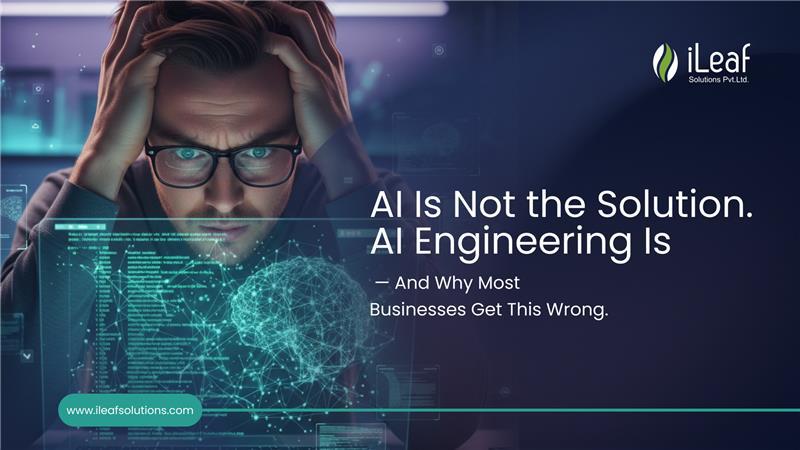The Rise of AI: How Artificial Intelligence is Revolutionizing the Healthcare Sector

Artificial Intelligence (AI) is rapidly revolutionizing every industry, and the healthcare sector is no exception. With its potential to transform patient care, enhance diagnostics, and enable personalized medicine, AI is a game-changer in healthcare. From reducing medical errors to improving operational efficiency, this technology has the power to reshape the future of healthcare as we know it. In the age of AI, healthcare providers can harness the power of machine learning algorithms to analyze vast amounts of data and make accurate predictions. This allows doctors to provide personalized treatment plans based on an individual's unique genetic makeup, medical history, and lifestyle factors. Moreover, AI-powered systems can assist in early disease detection by identifying subtle patterns in medical imaging or lab results, ensuring early intervention and better patient outcomes. By automating repetitive tasks and streamlining workflows, AI has the potential to alleviate the burden on healthcare professionals, enabling them to focus more on patient care. Furthermore, AI-powered chatbots and virtual assistants can improve patient engagement and enhance access to healthcare services.
As AI continues to evolve, it holds immense promise for the future of healthcare, revolutionizing the way doctors treat patients, improving diagnosis, and ultimately saving lives.
Benefits of AI in the healthcare sector
AI offers numerous benefits to the healthcare sector, making it an invaluable tool for healthcare providers. This enables doctors to provide personalized treatment plans based on an individual's unique genetic makeup, medical history, and lifestyle factors. By leveraging machine learning algorithms, AI systems can identify patterns in data that humans may not be able to detect, leading to more precise diagnoses and tailored treatment options. Moreover, AI has the potential to improve patient outcomes by facilitating early disease detection. AI-powered systems can analyze medical imaging or lab results, identifying subtle patterns that may indicate the presence of a disease. This early detection allows for timely intervention and better prognosis. Additionally, AI can assist healthcare providers in predicting patient outcomes and assessing the likelihood of certain complications, enabling proactive measures to be taken. Another significant benefit of AI in healthcare is its ability to automate repetitive tasks and streamline workflows. By taking over routine administrative tasks, AI frees up healthcare professionals' time, allowing them to focus more on direct patient care. This not only improves patient satisfaction but also reduces the risk of errors and enhances operational efficiency. AI-powered chatbots and virtual assistants can also play a role in patient engagement and access to healthcare services, providing round-the-clock assistance and answering common questions.
Examples of AI applications in healthcare
AI-powered virtual assistants and chatbots are also making their way into healthcare settings, enhancing patient engagement and accessibility. These conversational AI tools can answer questions, provide basic medical information, and even triage patients based on their symptoms. This improves access to healthcare services, especially for those in remote areas or with limited resources. Virtual assistants can also monitor patients remotely, collecting data and alerting healthcare providers to any potential issues, allowing for early intervention and reducing hospital readmissions.
AI-powered medical imaging and diagnostics
AI has shown remarkable promise in the field of medical imaging and diagnostics. Traditional approaches to medical imaging analysis can be time-consuming and subjective, leading to potential errors or missed findings. AI-powered algorithms, on the other hand, can analyze images with incredible speed and accuracy, aiding radiologists in making more precise diagnoses.
For example, AI algorithms can analyze mammograms to detect early signs of breast cancer, allowing for timely intervention and improved survival rates. Similarly, AI can analyze chest X-rays to identify abnormalities indicative of lung diseases, such as pneumonia or lung cancer. By automating the identification and analysis of these conditions, AI can significantly reduce the burden on radiologists and improve the overall quality of patient care.
Furthermore, AI-powered diagnostics can assist in the interpretation of medical test results, such as blood tests or pathology reports. By analyzing patterns and correlations in large datasets, AI algorithms can identify potential risk factors or predict the likelihood of certain diseases. This can aid healthcare providers in making informed decisions about treatment options and preventive measures.
The potential of AI in medical imaging and diagnostics is immense, and ongoing research and development in this field are expected to further enhance its capabilities. As AI algorithms become more sophisticated and datasets grow larger, the accuracy and efficiency of medical imaging analysis will continue to improve, leading to better patient outcomes.
AI-powered drug discovery and clinical trials
The process of drug discovery and development is often time-consuming, expensive, and uncertain. However, AI has the potential to revolutionize this field by accelerating the identification of potential drug candidates and predicting their efficacy. AI algorithms can analyze vast amounts of data, including genetic information, medical records, and scientific literature, to identify patterns and correlations that may not be immediately apparent to humans. This allows researchers to narrow down the search for effective treatments and target specific patient populations. AI can aid in the prediction of drug toxicity and side effects, allowing researchers to prioritize safer drug candidates for further development. By analyzing existing data on drug toxicity and adverse reactions, AI algorithms can identify potential risks and help researchers make informed decisions about which compounds to pursue.
Overall, AI has the potential to transform the drug discovery and clinical trial process, making it more efficient, cost-effective, and targeted. As AI technologies continue to advance, the development of new treatments and therapies may become faster and more precise, benefiting patients worldwide.
AI-powered virtual assistants and chatbots in healthcare
Conversational AI tools can answer common questions, provide basic medical information, and even triage patients based on their symptoms. By leveraging natural language processing and machine learning algorithms, virtual assistants can understand and respond to patient queries in a human-like manner, increasing patient engagement and satisfaction. Virtual assistants can also play a role in remote patient monitoring, collecting data on vital signs, symptoms, and medication adherence. This allows healthcare providers to monitor patients' health remotely and intervene if necessary, reducing the need for in-person visits and hospital readmissions. Chatbots are also being used in mental health settings to provide support and counseling. These AI-powered chatbots can engage in conversations with users, providing empathy, understanding, and evidence-based advice. While chatbots cannot replace human therapists, they can serve as an initial point of contact, offering immediate support to those in need.
The use of virtual assistants and chatbots in healthcare is expected to increase in the coming years, driven by advances in AI technology and the growing need for accessible and cost-effective healthcare services.
Ethical considerations and challenges of AI in healthcare
AI systems are trained on large datasets, which may contain inherent biases based on factors such as race, gender, or socioeconomic status. If these biases are not addressed, AI algorithms can perpetuate existing healthcare disparities and inequalities. It is crucial to ensure that AI algorithms are trained on diverse and representative datasets and regularly monitored for bias. Another ethical consideration is the privacy and security of patient data. AI relies on vast amounts of data, including sensitive medical information. Healthcare organizations must take appropriate measures to protect patient privacy and prevent unauthorized access to data. This includes implementing robust data encryption, access controls, and regularly updating security protocols. As AI systems become more complex, it can be challenging to understand how they arrive at certain decisions or recommendations. Healthcare providers and researchers must ensure that AI algorithms are transparent and explainable, allowing for better trust and accountability.
The deployment of AI in healthcare also raises questions about the role of healthcare professionals. While AI can automate certain tasks and streamline workflows, it is important to remember that healthcare is fundamentally a human-centered field. AI should be seen as a tool to enhance, rather than replace, the expertise and judgment of healthcare professionals. It is crucial to strike a balance between the use of AI and the preservation of the human touch in patient care.
Future trends and advancements in AI healthcare technology
As AI systems become more complex, there is a need to understand how they arrive at certain decisions or predictions. Researchers are working on developing explainable AI algorithms that can provide insights into the underlying reasoning process, increasing trust and facilitating better decision-making. Moreover, the integration of AI with other emerging technologies, such as the Internet of Things (IoT) and wearable devices, holds great potential in healthcare. By combining AI with real-time data from sensors and wearables, healthcare providers can monitor patients' health remotely, detect early warning signs, and intervene when necessary. This can lead to more personalized and proactive healthcare, improving patient outcomes and reducing healthcare costs.
Additionally, the use of AI in genomics and precision medicine is expected to grow in the future. AI algorithms can analyze vast amounts of genomic data, identifying genetic markers and patterns associated with specific diseases. This allows for more targeted treatments and the development of personalized medicine approaches. AI can also assist in predicting patient responses to certain treatments, enabling healthcare providers to make more informed decisions about the best course of action.
Lastly, the ethical and regulatory aspects of AI in healthcare will continue to be a focus of attention. Governments and regulatory bodies are working on establishing guidelines and frameworks to ensure the responsible and ethical use of AI in healthcare. This includes addressing concerns related to bias, privacy, and accountability.
Implementing AI in healthcare organizations
The successful implementation of AI in healthcare organizations requires careful planning and consideration.
1. Identify areas of need: Assess the current challenges and pain points in your healthcare organization. Determine which areas could benefit the most from AI technologies, such as medical imaging, diagnostics, or administrative tasks.
2. Collaborate with experts: Engage with AI experts and healthcare professionals to develop a customized AI strategy that aligns with your organization's goals and resources. Leverage their expertise to identify the most suitable AI solutions for your specific needs.
3. Collect and prepare data: AI algorithms require large amounts of data to train and operate effectively. Ensure that your organization has access to high-quality, well-curated data that is representative of the patient population you serve. Implement data collection and preparation processes that adhere to privacy and security regulations.
4. Invest in infrastructure and technology: To leverage AI effectively, healthcare organizations need robust infrastructure and technology capabilities. This includes powerful computing resources, secure data storage, and AI-specific software and tools. Consider partnering with technology providers or investing in in-house capabilities to support AI implementation.
5. Train and educate staff: AI implementation requires a workforce that is knowledgeable and comfortable with AI technologies. Provide training and education programs to ensure that healthcare professionals and staff understand the potential of AI and how to use it effectively in their roles.
6. Monitor and evaluate: Regularly monitor and evaluate the performance of AI systems in your organization. Collect feedback from healthcare professionals and patients to identify areas for improvement and address any concerns. Continuously update and refine your AI strategies to keep up with advancements in the field.
By following these steps and adopting a thoughtful and strategic approach, healthcare organizations can successfully implement and leverage AI technologies to improve patient care, enhance efficiencies, and drive innovation in the healthcare sector.
Conclusion: The transformative impact of AI in the healthcare sector
As the healthcare landscape continues to evolve, iLeaf Solutions' dedication to harnessing the power of AI ensures that healthcare providers can effectively meet the ever-growing demands for quality patient care. By embracing AI, iLeaf Solutions not only contributes to the ongoing healthcare revolution but also helps establish a foundation for a more efficient, accurate, and patient-centric future in healthcare.
However, the implementation of AI in healthcare also raises ethical considerations and challenges, such as bias, privacy, and the role of healthcare professionals. It is crucial to ensure that AI algorithms are transparent, explainable, and used responsibly to preserve the human touch in patient care. Looking ahead, future trends and advancements in AI healthcare technology include improved interpretability of AI algorithms, integration with IoT and wearable devices, and the use of AI in genomics and precision medicine. Healthcare organizations can successfully implement AI by identifying areas of need, collaborating with experts, collecting and preparing data, investing in infrastructure and technology, training and educating staff, and monitoring and evaluating performance.
In conclusion, AI has the potential to reshape the future of healthcare, transforming the way doctors treat patients, improving diagnosis, and ultimately saving lives. With careful planning, implementation, and a human-centered approach, AI can be a powerful tool in driving innovation and improving patient outcomes in the healthcare sector.














